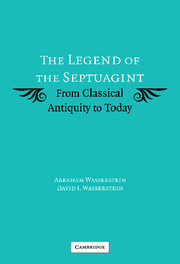Book contents
- Frontmatter
- Contents
- Preface and Acknowledgments
- Abbreviations
- Introduction
- 1 The Letter of Aristeas
- 2 The Hellenistic Jewish Tradition
- 3 The Rabbis and the Greek Bible
- 4 The Ptolemaic Changes
- 5 The Church Fathers and the Translation of the Septuagint
- 6 Among the Christians in the Orient
- 7 The Muslims and the Septuagint
- 8 Yosippon and the Story of the Seventy
- 9 Karaites, Samaritans and Rabbanite Jews in the Middle Ages
- 10 The Septuagint in the Renaissance and the Modern World
- Conclusion
- Appendix: In Partibus Infidelium: Zosimus of Panopolis
- Bibliography and Sources
- Index
Preface and Acknowledgments
Published online by Cambridge University Press: 17 July 2009
- Frontmatter
- Contents
- Preface and Acknowledgments
- Abbreviations
- Introduction
- 1 The Letter of Aristeas
- 2 The Hellenistic Jewish Tradition
- 3 The Rabbis and the Greek Bible
- 4 The Ptolemaic Changes
- 5 The Church Fathers and the Translation of the Septuagint
- 6 Among the Christians in the Orient
- 7 The Muslims and the Septuagint
- 8 Yosippon and the Story of the Seventy
- 9 Karaites, Samaritans and Rabbanite Jews in the Middle Ages
- 10 The Septuagint in the Renaissance and the Modern World
- Conclusion
- Appendix: In Partibus Infidelium: Zosimus of Panopolis
- Bibliography and Sources
- Index
Summary
This book is an essay in tracing the life of the legend that grew up around the origin of the Greek translation of the Hebrew Bible. It is not concerned, except incidentally, with how that translation, surely the most momentous literary enterprise in the annals of western mankind, came into being. The answer to that question is largely unknown and must be sought mainly in the internal evidence of the texts. That task must be left to textual critics and other students of the Greek Old Testament. What is presented here is an analysis of the legend of the original translation of the Pentateuch.
As far as our evidence allows us to judge, the legend of the Pentateuch has its beginning in the Letter of Aristeas. We have attempted to examine the embellishments that later generations added to the story as told in that work. Commentators, apologists and polemicists belonging to different traditions, in Jewish hellenism and in rabbinic Jewry no less than in the Christian churches and in the world of Islam, often used the legend for partisan purposes. Their additions were inspired by various theological and sectarian interests, and they created narrative patterns, literary motifs and models of special pleading that lived on for many centuries, occasionally in unexpected places. To this day the legend exerts its power over the formulation of arguments about the inspiration of sacred texts.
- Type
- Chapter
- Information
- The Legend of the SeptuagintFrom Classical Antiquity to Today, pp. ix - xviPublisher: Cambridge University PressPrint publication year: 2006

